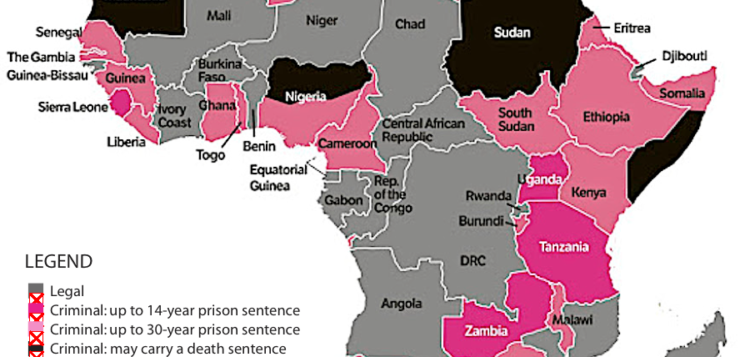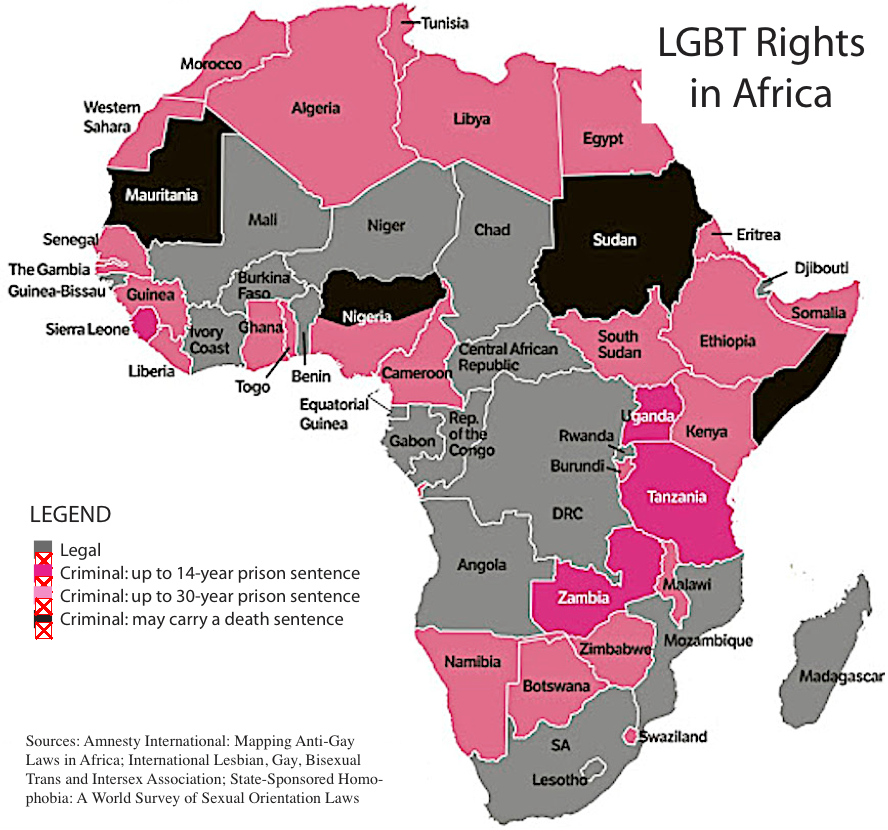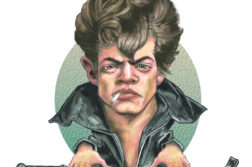HOMOSEXUALITY is a hot-button issue in Africa today. Much of the fervor is fueled by demagogic politicians who want to distract their people from the issues that really matter, such as runaway corruption and nepotism. Many politicians today are in office because they are riding high on the homophobia that they’ve created and stoked. Some use phrases such as “Homosexuals are more lethal than all natural disasters put together” and then go ahead to implement draconian laws such as life imprisonment.
Not long ago, it used to be tribal politics that ruled in the war of “us” against “them.” If they take office, they will steal our cattle, land, and wives and make us wear shorts. We as a tribe need to pull together to keep them at bay. Today, however, tribalism is widely frowned upon in Kenya and elsewhere in Africa. Publicly denouncing another tribe can be considered hate speech. Consequently, our leaders have sought and found a new target, another group that everyone can hate or see as less human—a common evil that can mobilize the masses. It was Anton Chekhov, the short story writer I most revere, who said that love, friendship, and respect do not unite a people as much as a common hatred for something.
Humans have sought to ostracize other groups of humans throughout history, singling out a group that can be blamed for all the problems in society. If drought comes or disease breaks out, it’s their fault. For the Nazis, they were the Jews. For the Hutu, they were the Tutsi. For Trump, they are basically everyone who’s not of European descent. For many Africans today, they are LGBT people.
This is the same kind of propaganda being peddled today by our political and religious leaders. But this time, it isn’t about wars or tribes, but about whom people are allowed to love. These demagogues stir a hornet’s nest with their speeches. One of these vilifying speeches snakes its way one afternoon into a dingy bar, where it finds a bunch of loafers, whose conversation goes something like this:
“I tried chatting up Awinja the other day,” one says, “but she thinks she’s too good for me.”
“Who is Awinja?” another asks.
“She’s that long-legged close-shaven girl who lives near the pork butchery.”
“Oh, but I hear she likes girls,” yet another says.
“That’s because she’s never been with a real man like me,” boasts another.
“Girls like Awinja need to be cured of their disgusting lesbianism and hatred for men, just as our MP says,” says another. “What do you say, boys?”
The gang seeks out Awinja to cure her by brutally raping her, since they are doctors and that is the remedy. As she cries out, one informs her that bitter medicine works best. When she reports to the police, nothing is done. She is a “misfit” who got what she “deserved.”
“Un-African”—that is how homosexuality is characterized and how much of the hate speech is justified. “White man’s disease,” it is called, brought in by ship when the Europeans colonized our lands. But dismissing homosexuality in this way is hypocrisy of the highest degree. Today, not much of our lives can be described as “African.” A typical urban African wakes up in a house with indoor plumbing, toasts their bread, fingers their smartphone, dresses in a suit or pantsuit, and boards a matatu or an okada to work. Let’s not forget that many of us favor Western names over our own, opt to speak in Western languages to be deemed progressive and educated, prefer wigs over our African hair, and even bleach our skin.
Homosexuality is not new in Africa. It did not arrive with the white man during colonization as some people would want us to believe. Many African cultures have a name for homosexuality as old as the cultures themselves. People of many communities across Africa have practiced homosexuality in one form or another. The earliest recorded homosexual couple lived around 2400 BC in Egypt. These were royal court manicurists named Khnumhotep and Niankhkhnum. Their love for each other was so strong that when they died they were buried in the same tomb. Other classic examples are the cave paintings of the San of Zimbabwe, which are thousands of years old, depicting homosexual acts between men.
The fact is, it is homophobia that was brought by the missionaries who came to Africa and curtailed most of our sexual practices, including heterosexual ones, calling them savage and demonic. For instance, Christian missionaries tried to ban sexual relations during the day, allowing a man to lie with his wife only once a night, and only in the “missionary position.”
Many Africans are of the belief that homosexuality is against their religion. And yet, mainstream religions in Africa—mostly forms of Christianity and Islam—cannot in all honesty be called “our” religions. These are religions that are heavily laden with their European and Middle Eastern origins, and both are highly critical of black people. White Christians in the past have quoted verses from the Bible to justify the capture, enslavement, and oppression of black people. Colossians 3:22-25 states that slaves should obey their earthly masters in everything, and do it with all their hearts as if working for the Lord. In so doing they will receive an inheritance from the Lord as a reward. In Islam, “black” and “slave” are used synonymously.
Many religious Africans have a tendency to take everything their religion says at face value, and this literalism has proved to be highly problematical. It’s why demented people sometimes misinterpret the doctrines of these religions and do terrible things: an African may blow himself up in a crowded market over these imported religions. When I was a teenager we lived next to a staunch Christian woman who had three small children. Her husband worked in the city and didn’t come home for months at a time. Because her church believed that people who die young, before they reach the age of accountability, are given a free pass to Heaven, she drowned her children in the local lake.
In Africa, one is Catholic or Protestant or Muslim mostly because that religious group reached their village first during the scramble for and partitioning of Africa. In my village, Njogu-ini (the land of the elephants), in Central Kenya, it was the Presbyterians who got there first at around the turn of the 20th century. My paternal great grandmother was a little girl then. She was baptized and christened as Tabitha, a biblical name.
Ever since then, my family and the entire village at large have been Protestant, passing it down from generation to generation. I’ve always wondered what my life would have been like if the Muslims or Buddhists had reached our village first. I’m greedy by nature, so I would have relished the opportunity to marry up to four wives, or, instead of the Christian heaven and hell, embraced the promise of reincarnation.
§
I once had a gay friend who was in the closet for most of his short life. Kamara (not his real name) and I were as close as brothers. Many found him a bit strange. As nursery school kids, I recall that he liked to play mother when we played house. As the years progressed, I noticed he was acutely conscious of his looks. I remember constantly rebuking him for spending too much time in front of the mirror.
We went to the same boys’ boarding school. He made the rest of us look like a bunch of greasy mechanics. His clothes were always cleanest and he took a shower daily. He had long polished nails that always got him in trouble with the teachers, and he loved to plait his hair on weekends. Sometimes when he walked, you would think he was cat-walking. Some boys hated him at first but gradually came to like him for his uniqueness.
When we talked about girls he seemed quite bored. When one of the boys managed to smuggle a dirty magazine to school, Kamara was never among the hordes fighting to get at it. In Form Three [a high school curriculum], Kamara and I were both appointed dorm captains. He was the Batian and I was the Lenana captain. Every Saturday we did general cleaning of the dorms, and there was a competition overseen by teachers on duty to see which dorm was the tidiest. Batian almost always won among the eight dorms.
Being a dorm captain came with benefits. Our school had a policy of random locker searches by our teachers. Dorm captains were exempt from this degrading ordeal. (Nothing is more uncomfortable than your chemistry teacher feeling your underpants when checking for contraband.) Therefore, many students would hide their illicit goods like marijuana, snuff, and the dirty magazines in the lockers of dorm captains, for a small fee, of course. Dorm captains were entrusted with making duty rosters, and some rich students did bribe us handsomely to be exempted from duties, such as scrubbing the dorm floors. Kamara was the only upright dorm captain who didn’t condone such corruptions.
Kamara and I attended the same college and shared a room. Seeing how he had no interest in wooing any women, that was when I knew my best friend suffered from the “white man’s disease.” I went out one evening to a party and came back with two tipsy voluptuous ladies, one for me and one for him. Kamara broke down in tears and I had to kick the girls out. He made a clean break of everything.
“Why on earth would you choose to be gay?” I asked.
Kamara looked daggers at me. “Tell me, why would anyone choose to be gay?” Frankly I didn’t have an answer. So I kept mum and paced about the room, arms akimbo. “Being gay in Africa is like living with leprosy,” he said. “Why would I wish that on myself?”
“I just don’t get it,” I said. “We were brought up in the same village, attended the same schools. Where did you lose a step?”
“I didn’t lose a step anywhere. I have always been this way,” Kamara said. “Think about it. Who would choose to be a homosexual and go through all the hatred, danger and ridicule that comes with the tag?’
Seeing that Kamara was somewhat making sense, and remembering all the odd mannerisms he had since childhood, I did my research in the coming weeks and came to realize what a fool I had been. I apologized profusely. Condemning one for being gay is as illogical as condemning one for being left-handed, I learned. Science says homosexuality is natural. Religion calls it an abomination. Remember, this is the same science that saves lives in hospitals, not the hundred clasped hands in prayer.
I sadly read of how doctors in the past had subjected homosexuals to cruel practices, trying to “cure” them. Men were castrated and women had their wombs removed. Other doctors, thinking it was a mental illness, cut into patients’ brains and subjected many others to repeated use of electroshock. Nothing worked, of course.
After college, Kamara and I were scattered by the wind in pursuit of bread, but we talked regularly over the phone. When in his mid-twenties, Kamara’s parents began pressuring him to settle down. “This Christmas do not come home without a lady in your arms,” his mother would say, “and if her belly is protruding, so much the better.”
When I visited the village from time to time and happened to bump into Kamara’s mother, she would whisper in my ear: “You have been friends with my son since childhood. You know how shy he is in the presence of ladies. Why don’t you introduce him to some of your lady friends, my child?”
“I will, mother,” I would lie. I knew she would cry out that demons had possessed her son if I revealed the truth to her. I tried dropping clever quotations as a subtle hint, such as “Heterosexuality is not normal; it’s just common.” I pointed out that homosexuality is neither a sickness nor a choice; it is natural and involuntary. But in general I held my tongue in her presence. It wasn’t my place to shove Kamara out of the closet.
A week before Christmas 2016, Kamara’s boss got wind of his sexual orientation and fired him. Kamara went home without a woman in his arms. Everyone was disappointed, but not as much as when he told them it was because he was gay, was tired of living a lie, and hoped they would accept him as he was. His father shouted that it would have been better if his mother had given birth to a frog than to a son like him who brought such shame to the family. “Get out and never come back,” his father screamed. “The day you hear me call you my son again, take my name and give it to a dog.”
Kamara hanged himself on New Year’s Eve 2017 in a cheap motel. On that day, Africa lost a gifted young man. He would have made a noble leader—something that is greatly needed in our dear continent. But the prevalence of homophobia has robbed us of his talent.
§
Homosexuals are like poetry. They are hated because they are not understood. Anyone should be able to love and be loved by a member of whichever sex, as long as they are two consenting adults. It should be a fundamental right, a civil right. In this modern era, homophobia in Kenya and other parts of Africa is reminiscent of racism in Jim Crow America and Apartheid in South Africa.
We are in a place that is still considered the Dark Continent, the Third World. Africans in this day and age are still dying from hunger and thirst. Children are still dying by the hundreds of thousands every year from quite preventable diseases such as malaria. Our lawmakers are paid more than lawmakers of First World countries. We have major issues that require solutions, but we would rather discuss what two consenting adults are doing behind closed doors. This isn’t right, and it’s about time we redirected our energies to what actually matters.
I have a dream that one day LGBT people in Africa will no longer be treated as second-class citizens. They will be judged by the content of their character and not their sexuality. They will be permitted to go about their lives as freely as heterosexuals, not hiding their sexuality from their employers and landlords, to walk hand-in-hand in the streets, to run for public office, to get married and start families. To our political leaders I say: let the wheels of time find you on the right side of history!
Tony Njoroge is a Kenyan writer who has been published byLitro magazine, October Hill magazine, andScarlet Leaf Review. He studied English and literature at Laikipia University, Kenya.






